- Home
- Al Sarrantonio
Journey - Book II of the Five Worlds Trilogy
Journey - Book II of the Five Worlds Trilogy Read online
JOURNEY: THE FIVE WORLDS SAGA, BOOK 2
Al Sarrantonio
A Mystique Press Production
Mystique Press is an imprint of Crossroad Press
Digital Edition published by Crossroad Press
Digital Edition Copyright © 2011 / Al Sarrantonio
Copy-edited by: Christine Steendam
Background Images provided by:
sadmonkeydesign-res.deviantart.com
deviantvicky.deviantart.com
LICENSE NOTES
This eBook is licensed for your personal enjoyment only. This eBook may not be re-sold or given away to other people. If you would like to share this book with another person, please purchase an additional copy for each person you share it with. If you’re reading this book and did not purchase it, or it was not purchased for your use only, then you should return to the vendor of your choice and purchase your own copy. Thank you for respecting the hard work of this author.
Meet the Author
Al Sarrantonio is the author of forty-five books. He is a winner of the Bram Stoker Award and has been a finalist for the World Fantasy Award, the British Fantasy Award, the International Horror Guild Award, the Locus Award and the Private Eye Writers of America Shamus Award.
His novels, spanning the horror, science fiction, fantasy, mystery and western genres, include Moonbane, Skeletons, House Haunted, The Five Worlds Trilogy, The Mars Trilogy, West Texas, Orangefield, and Hallows Eve, the last two part of his Halloween cycle of stories.
Hailed as “a master anthologist” by Booklist, he has edited numerous collections, including the highly acclaimed 999: New Stories of Horror and Suspense, Redshift: Extreme Visions of Speculative Fiction, Flights: Extreme Visions of Fantasy, and , and, most recently, Stories, with co-editor Neil Gaiman, and Halloween: New Poems.
His short stories have appeared in magazines such as Heavy Metal, Twilight Zone, Isaac Asimov’s Science Fiction Magazine, Realms of Fantasy, Analog, and Amazing, as well as in anthologies such as The Year’s Best Horror Stories, Visions of Fantasy: Tales from the Masters, Great Ghost Stories, and The Best of Shadows. His best horror stories have been collected in Toybox, Hornets and Others, and Halloween and Other Seasons.
He has had numerous book club sales, and his work has been translated into more than a dozen languages and appeared in comic book form. He currently lives in New York’s historic Hudson Valley region.
Other Books by Al Sarrantonio
Novels:
The Worms
Moonbane
Skeletons
October
The Boy With Penny Eyes
House Haunted
Thomas Mullin Mysteries
West Texas
Kitt Peak
The Masters of Mars Trilogy
Haydn of Mars
Sebastian of Mars
Queen of Mars
The Five Worlds Trilogy
Exile
Journey
Return
Collections:
Toybox
Hornets and Others
Halloween & Other Seasons
The Orangefield Series
Horrorween
Hallows Eve
Halloweenland
DISCOVER CROSSROAD PRESS
Visit us online
Check out our blog and
Subscribe to our Newsletter for the latest Crossroad Press News
Find and follow us on Facebook
Join our group at Goodreads
We hope you enjoy this eBook and will seek out other books published by Crossroad Press. We strive to make our eBooks as free of errors as possible, but on occasion some make it into the final product. If you spot any errors, please contact us at [email protected] and notify us of what you found. We’ll make the necessary corrections and republish the book. We’ll also ensure you get the updated version of the eBook.
If you’d like to be notified of new Crossroad Press titles when they are published, please send an email to [email protected] and ask to be added to our mailing list.
If you have a moment, the author would appreciate you taking the time to leave a review for this book at your favorite online site that permits book reviews. These reviews help books to be more easily noticed.
Thank you for your assistance and your support of the authors published by Crossroad Press.
For Tom Disch,
Mentor:
With long overdue thanks.
Chapter 1
Teacher said, “The Carthaginians, an ancient Earth race, were known primarily for their migratory abilities within their own small sphere.”
For the fiftieth time this morning, Visid Sneaden’s eyes wandered from the holographic Screen image of the robed instructor to the room’s floor-to-ceiling window. Outside, red dust was kicking up; it had been threatening to storm since sunrise. The pink sky had visibly darkened, and at the horizon what looked like the cone of a tornado had appeared briefly, toying with the rim of Wells Crater. But so far, the Screen had not blanked and they had not been sent home.
Visid prayed for release; had prayed all week. She was weary of lessons, wearied most of all by their increased intensity. Instruction was bad enough, but the recent increase in daily school hours from nine to eleven had incurred in Visid, and in her classmates, she supposed, a condition close to dust blindness. So much information—most of it tedious—and so little time to digest it. It was said that there was a reason; was whispered in the dormitories, in the lowest tones, that the reason was a drastic one: that they were to be returned to Venus within the month. Visid didn’t believe this: there had been such rumors before.
So instead she prayed for … dust storms.
And still the day dragged on, without release. At lunchtime, which had recently been cut in half, Visid stayed, as usual, by herself. A cluster of other students sat by the Screen, listening to Doctrine lectures; but since it was not mandatory now, Visid chose to abstain. She knew that her aloofness, and especially her reluctance to indulge in extra Doctrine, had been duly noted; she knew that somewhere, someone was compiling her minor rebellions into a compact evidential file, no doubt entered on a data card, and that sooner or later she would be interviewed about it.
But she didn’t care, even though she was not rebellious at all.
She was … bored.
The lessons, which were thorough but repetitive, had ceased to be of interest to her months ago. The other students around her, even those she had nominally made friends with, such as Arnie, didn’t seem to notice that they were being fed the same diet day after day, only with different seasonings. In Visid’s mind, once the facts had been absorbed, she found the outer coating with which they were presented to be of no interest or use. The occasional new tidbit or fact she was able to glean from the mountain of Canon (no one dared say propaganda) she was fed was not enough to sustain her interest.
And so her mind wandered.
And she prayed for dust storms.
After lunch came Theory, and after that came Fact (indistinguishable from Doctrine) and then Culture (again indistinguishable from Doctrine). For a few moments, her attention was drawn from the window to the Screen during today’s Culture lesson, which concerned Titan. The teacher, a gaunt, almost sickly-looking man with light Martian features, was full of zeal, which usually produced ennui in Visid. But in the midst of his harangue about the evils of Titanians, and especially the depraved mind and ancestry of Wrath-Pei, the present Titanian despot and former pirate, whose ouster from Mars (now celebrated as a Martian holiday) where he had once “fouled the atmosphere of the already corrupt Senate, to the point w
here his poison had so infected his fellow Martians that only the High Leader himself, then a humble servant of the people known only as Prime Cornelian, was able to free Mars of the base Wrath-Pei himself and then, with the heroic act of a true patriot and lover of Mars, to free the planet of the vile and contemptible institution the Martian Senate, which was Wrath-Pei’s base for his loathsome operations, including but not confined to child prostitution, the eating of human flesh, the boiling of pregnant mothers alive,” etc., etc.—in the midst of this mishmash, Visid learned something new.
It was long known to Martian Schoolchildren and their Venusian expatriate cousins, that Wrath-Pei confined himself to the “stench-filled environs of Titan itself; Titan: whose atmosphere was unbreathable to any but corrupt beings, whose poison-filled oceans made those of Earth look paradisaic, whose surface was warmed by no natural sun but by an infernal internal heat source, which also produced an artificially enhanced gravity similar to that of the penal planet Pluto; whose perpetual night (so appropriate) was only broken by unnatural lights, and where the warming Sun would shine but weakly; and whose hell-darkened sky, nearly as black as the rogue exile planet Pluto’s, was dominated not by Sol but by devilish Saturn.” Never in any lesson in Ethics, Doctrine, History, Science, Politics, Theory, Fact, or Religion (where the satanic qualities of Titan’s dominant religion, Moral Guidance, were more than emphasized) had Visid ever heard a single utterance even hinting that the despised Wrath-Pei was anywhere other than his own planet. It was not necessary for Martian mothers to scare their children with threats of Wrath-Pei, because the baby-eater and pirate would never dare come near Mars to begin with.
But today, there was a slip—and new information.
Deep into the usual blather, the teacher suddenly gave a hitch in his speech, as if his eyes had hit unfamiliar words on his prompter, and then he continued, “And so, dear students, when the vile corrupter, Wrath-Pei, is turned back to his nest, driven back down into the befouled Titanian muck from which he seeks to rise…”
Visid’s eyes were immediately glued to the Screen; she waited for more, but the teacher immediately lapsed into the familiar sermon: “Where Titanian children, deprived of every happiness, unlike we on Mars, thanks to the beneficent High Leader …”
And so on, and so on.
Visid, still startled by the nugget of new information which had tickled her ears, looked quickly around to see if anyone else had noticed.
All eyes were glued to the Screen, all faces, including that of Visid’s friend Arnie, painted with rapt stupor.
Was she the only one who noticed—or cared?
She stared raptly at the Screen for a while herself, waiting for new thoughts to come from the ill-looking Martian teacher, but nothing more was forthcoming.
Before long, Culture gave way to Religion, and once again Visid’s eyes were drawn to the window, where red dust danced in a pink sky outside.
It was after classes had finally ended, without deliverance from the threatening dust storm, which had abated, that Visid was abruptly faced with the summons she knew would one day come.
As the students rose after the Religion teacher’s lecture ended, the Screen blanked and then brightened once more, showing a Martian monitor, head shaved, Stern.
“Visid Sneaden, remain,” the monitor said, eyes unblinking.
The Screen went blank again.
Visid looked to Arnie; their eyes briefly locked before Arnie looked away; but as her friend filed past her she gripped Visid’s hand briefly and whispered, “Be good.”
Before Visid could answer, her friend had moved on, and soon Visid was left alone in the classroom. The door slid open, revealing an attendant.
The robot, a lower, undressed model, said, “Follow.”
With no alternative, Visid trailed the silver machine out of the classroom and into unfamiliar territory.
Her usual path, with all the other students, was right hallway, down stairs, short corridor, up stairs, out into waiting transport to dormitories.
Today she was taken left hallway.
Instantly, her curiosity and interest was awakened.
Pink sandstone soon gave way, after a short stairway down and through a windowless door to steel walls. Unopened doors lined both sides. Behind one Visid heard faint moaning, which sounded machinelike.
The untalking attendant led her onward.
Another hallway left, and then the first door stood open.
The robot stood outside and indicated that Visid should enter ahead of it.
As she passed she let her hand brush against the attendant’s chromed chest; its eyes briefly widened.
Inside a steel room was a chair, a desk, a larger chair behind it.
“Sit,” the attendant said.
Visid did so; when she turned to look at the attendant, it was gone and the door had slid closed.
Another door, behind the larger chair, slid open, and the Culture teacher, gaunt and even more sickly-looking in person, entered and sat down. He bore a hand viewer, which he placed on the desk. His colors were very pale, his forehead higher than it looked on Screen and his eyes more tired and lifeless.
“You’re—” Visid began.
“I have many duties,” the teacher began. “One of them is to instruct.”
The teacher activated the hand viewer and sat studying it. When Visid opened her mouth to speak, he held up his hand for silence.
“Let me complete what I’m doing,” he said tonelessly.
Visid studied the walls, which were without ornament; the floor, which was rugless; the desk, which seemed of a piece with the rest of the room, as if it had grown like a mushroom out of steel.
“Don’t fidget,” the teacher said.
Visid tried to sit still, without success.
“You have not responded to any instruction,” the teacher said, putting the viewer down on the desk and deactivating it.
“I’m bored.”
“So it would seem. But not so bored as to show reaction at new information today.”
Visid said nothing.
“You are extremely bright,” Teacher went on, but his voice was still toneless. “You are unresponsive to indoctrination.”
Visid sat motionless, not knowing how to act. “And yet your aptitude for sciences is remarkable.”
“My father was an engineer.”
“Yes. A Venusian traitor.”
“I was nine when he was killed.”
“And you are twelve now. The point?”
Visid regarded him unblinkingly, deciding within that it was safe to hate this man.
“There is … a special project for which you are being considered. I will recommend—continue to recommend—that you be turned down. You are too much a risk. If I am overruled, so be it. If you are accepted, so be it. If you are rejected from the program, either before or after, I will have your brain cleaned.”
The teacher looked at his desk. “You may go.” The door out into the hallway slid open.
Visid sat unmoving, strange emotions churning within her.
The teacher looked up, blinking in surprise that she was still there.
“Well?” he said, his pale eyes on her.
“I hate you, too,” she said, and ran out.
The attendant brought her to the usual transport departure tunnel and escorted her to a transport, empty save for herself, which brought her back to the dormitories.
Outside the window, the afternoon still churned with blowing sand; the abated storm was returning with vigor. Far over the rim of Wells Crater, in the middle of the pit itself, a dust devil whipped itself mad, then ripped to nothingness. The lowering sun, pale orange and small, nothing at all like Venus’s sun, looked frightened of the coming squall. It seemed to edge faster toward the horizon.
Venus.
Visid had not thought of it in a long time; indeed, there was little to think of. She remembered much of her father and more of her mother; she was present when her mother was killed
during the Mars-Venus conflict. Or, as it was known on Mars, the One-Day War. Though—after her subsequent arrival, along with hundreds of other Venusian children, on Mars—much counseling had sought to eradicate the bad memories from her mind, the single image of her mother’s body lying on the floor of her bedroom in two bisected parts was something that would never be stricken from her brain, even if the teacher had his way and had it wiped clean. Her father, she imagined, had been murdered by plasma soldiers the same way.
But she had been nine years old at the time, and little else in the way of Venusian memories remained. She did remember the sun as being larger and warmer, the sky as being pale blue instead of pink. The air on Venus smelled more like trees than Mars did, more of water than Mars. There was less dust. And she remembered the sight of a boat on a lake, and of a huge fish jumping from what looked like the sea. She thought her mother and father had taken her there but remembered nothing but these scattered images.
And yet after three years on Mars, she felt more of Venus than ever. Even if what she had in her mind was chimera, a false memory of a planet that was nothing like she imagined—indeed, the History lessons she had had on Venus showed images far more restrained and less romantic than those served up by her memory—those memories were more dear to her than vision of Mars. To her, Mars was, and would continue to remain, an alien planet.
And she felt no more than a visitor here.
The transport deposited her outside her dormitory building after the twenty-minute ride and immediately drove off. The dust storm was building to seriousness now. Shielding her eyes, Visid called for the dorm’s entrance to extend its dust shield to her, but there was no response.
“Shield, extend!” she shouted above the whistle of wind; when there was still no activation, the momentary thrill of fear went through her that perhaps she had been deliberately locked out.

 Five World Saga 01 Hornets and Others
Five World Saga 01 Hornets and Others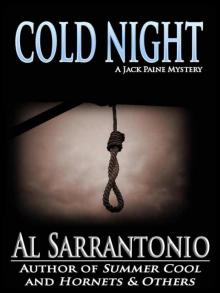 Cold Night (Jack Paine Mysteries)
Cold Night (Jack Paine Mysteries)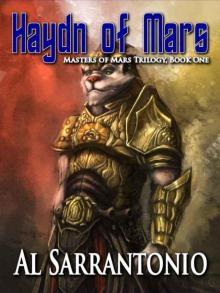 Haydn of Mars
Haydn of Mars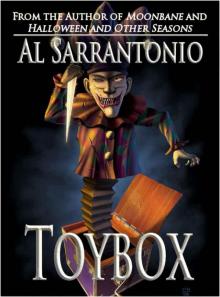 Toybox
Toybox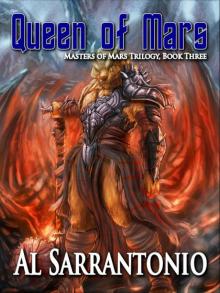 Queen of Mars - Book III in the Masters of Mars Trilogy
Queen of Mars - Book III in the Masters of Mars Trilogy Exile
Exile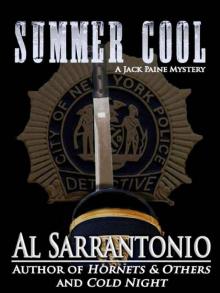 Summer Cool - A Jack Paine Mystery (Jack Paine Mysteries)
Summer Cool - A Jack Paine Mystery (Jack Paine Mysteries)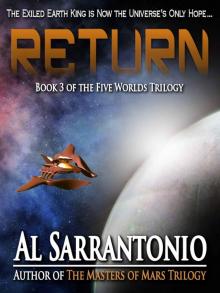 Return - Book III of the Five Worlds Trilogy
Return - Book III of the Five Worlds Trilogy The Orangefield Cycle Omnibus
The Orangefield Cycle Omnibus Summer Cool jp-2
Summer Cool jp-2 The Boy With Penny Eyes
The Boy With Penny Eyes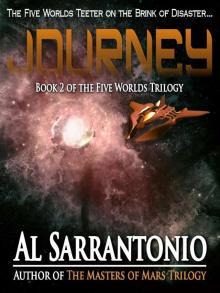 Journey - Book II of the Five Worlds Trilogy
Journey - Book II of the Five Worlds Trilogy Kitt Peak
Kitt Peak Campbell Wood
Campbell Wood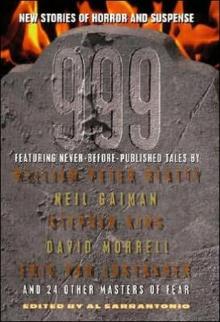 999
999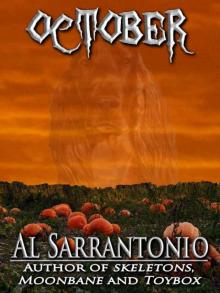 October
October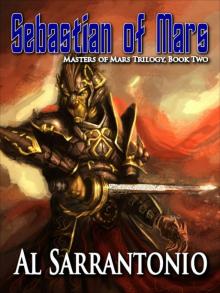 Sebastian of Mars
Sebastian of Mars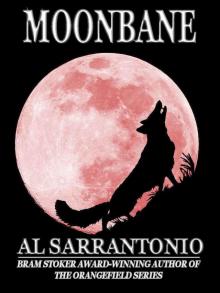 Moonbane
Moonbane Totentanz
Totentanz House Haunted
House Haunted Halloweenland
Halloweenland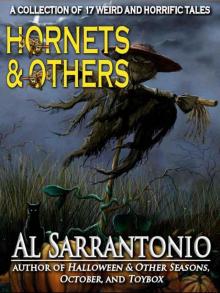 Hornets and Others
Hornets and Others